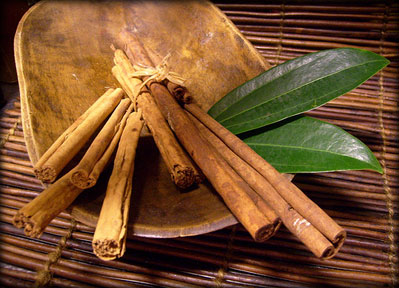Cinnamon gives a taste of paradise
by Shari Jayawardhana
Although Sri Lanka’s well-known export today is tea, cinnamon was
traditionally known to be the most important export at one time. In
fact, so strong is the association between cinnamon and Sri Lanka that
the very botanical name of the spice - Cinnamomum zeylanicum is derived
from Sri Lanka’s former name, Ceylon. However it was not cultivated
systematically until the time of colonial rule when the cultivation was
shifted from the mountainous regions to the more tropical western and
southern coastal belts.
It is historically known that the quest for Ceylon cinnamon was one
of the key factors that led to the explorations to the east in the 15th
century.
 It was the Portuguese who came to Ceylon in the 15th century and took
control of the spice trade from the Arabs who until then held the
cinnamon monopoly. It was the Portuguese who came to Ceylon in the 15th century and took
control of the spice trade from the Arabs who until then held the
cinnamon monopoly.
Advent of the Dutch
Thereafter, the Dutch took over the trade after displacing the
Portuguese and finally it was the British who controlled the cinnamon
trade when they ruled the country from 1815 till independence.
There are several varieties of cinnamon, but most common types are
True Cinnamon (Cinnamomum zeylanicum) and Cassia (Cinnamomum
aromaticum). Ninety percent of the world production of True Cinnamon
originates from Sri Lanka. Cassia Cinnamon is harvested in much larger
quantities and is mainly grown in Indonesia, Vietnam and China. Ceylon
cinnamon is a finer more delicate product, which uses the inner bark and
is manually layered to produce a quill similar to a Havana cigar.
The handcrafted process is time consuming and very traditional using
methods and tools unchanged for hundreds of years to date. The Ceylon
cinnamon is less dense and will crumble under harsh handling. The aroma
is sweeter, smoother and less harsh than the cassia.
Clean bark
Cassia is a single layer of clean bark, about ten times thicker than
Ceylon cinnamon and a quill when held is very stiff (like holding a
pencil). The flavour is stronger and more harsh than cinnamon.
True cinnamon is less known in the world due to several reasons.
Firstly, the availability of the product is less because 90 percent of
it is only grown in Sri Lanka.
The cost of manufacturing is higher due to delicate handling of the
product. If True Cinnamon is not available in the market, consumers are
not aware of what they are missing. The largest consumer of True
Cinnamon in the world is Mexico.
Cinnamon has been used for medicinal purposes for centuries and has
been known as a healing herb in both Ayurveda and Chinese traditional
healing systems.
The ancient Romans also used it as a cure for cold and flu and
problems of the digestive system. Cinnamon is known to relieve
congestion, stiff joints and muscles, while boosting brain power,
reducing blood clotting and healing the heart and colon.
Additionally, it is believed to have the ability to control type two
diabetes and to reduce blood cholesterol levels. Recent studies have
shown that cinnamon helps to cure urine tract infections and fights
tooth decay and gum disease. Cinnamon is also used as an insect
repellent while the cinnamon leaf oil is very effective in killing
mosquito larvae.
Condiment
Cinnamon is widely used as a condiment and a flavouring agent in
cooking and baking. Historically cinnamon played a major role in
preserving food, especially meat. Cinnamon is added to food items such
as salads, confectioneries, beverages, soups, stews and sauces. Cinnamon
flavoured tea too is increasingly becoming popular.
The cinnamon leaf and bark oils are used to flavour food products. |


